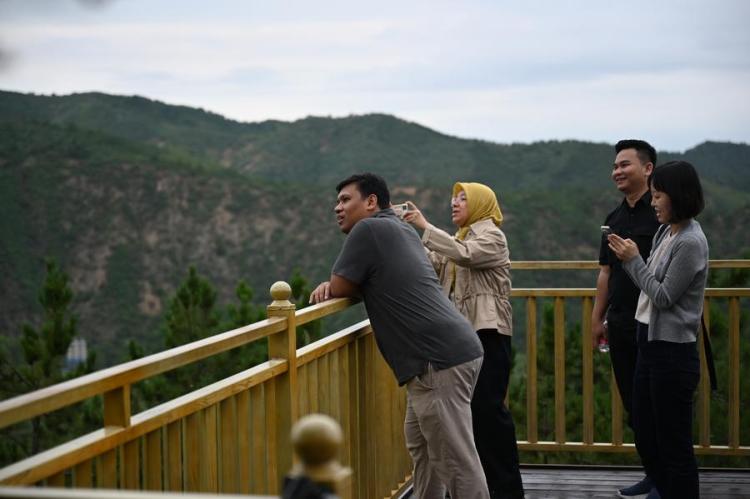International delegates laud China's green development

A group of delegates from countries including Laos, Indonesia, the United States and Japan have praised China's high-quality development through ecological environmental protection and harmonious coexistence between humans and nature.
From Sunday to Tuesday, the group visited the city of Chifeng, north China's Inner Mongolia Autonomous Region, as part of an international seminar jointly organized by the China Foundation for Human Rights Development and China Datang Corporation Ltd.
The delegates were impressed by Inner Mongolia's renewable energy development, ecological restoration and desertification control.
"CHINA IS INVENTING THE FUTURE"
On Monday, the delegates visited the Saihanba wind farm operated by China Datang. The wind farm has supplied 42.38 billion kWh of green electricity to regions including northeastern and northern China, equivalent to saving over 13.9 million tonnes of standard coal and reducing carbon dioxide emissions by over 42.25 million tonnes.
"In the field of renewable energy, China is inventing the future," said Harvey Cary Dzodin, chairman of HCD Earthcare Culture Association, adding the industry has offered transformation opportunities for many regions in the country.
"I am amazed by what I've seen in Inner Mongolia. My previous impression of the region was a lot of sheep, ancient history and good food, but now this land has become a leader in renewable energy development."
The foreign delegates were particularly interested in China Datang's future development and international expansion plans and looked forward to potential future collaboration.
"The last time I visited China, the sky was often gray, but now it is blue. I believe China has made significant progress in environmental protection and renewable energy development," said Andriah Feby Misna, director of Various New Renewable Energy, Ministry of Energy and Mineral Resources of the Republic of Indonesia.
Indonesia is also actively pursuing clean energy, and there is great potential for cooperation between the two countries, she said.
"THIS IS WIN-WIN"
On Tuesday, the delegates visited a new road in a desertification control area in Ongniud Banner, which stretches across the vast desert with grass grids on both sides that act like a "net" to hold the shifting sands in place.
"I have never seen anything like this before," said Dzodin, who was among the delegates who gathered around Wu Hua, deputy director of the Ongniud Banner Forestry and Grassland Bureau, to learn about sand control.
"We use reeds to create grids to significantly reduce wind speed, and then plant sand-resistant species within the grids to further stabilize the sand," Wu said.
"While combating desertification, the local government also increases the income of the community members by employing them in these projects. This is win-win, reflecting China's determination to continually improve the lives of its people," Dzodin said.
Dzodin plans to arrange for more young people to visit China to learn about ecological restoration projects and contribute to the protection of the planet.
The delegates also visited the Ma'anshan forest farm in Harqin Banner.
Valaxay Lengsavad, deputy head of the Lao People's Revolutionary Party Central Committee's commission for external relations, said locals had overcome great challenges to achieve denser forests and more wildlife.
Laos, with its many mountains and forests, has great potential for cooperation with China in ecological protection, he said.
